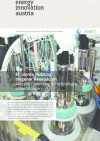Suchergebnisse für "Factsheet: Energietechnologien gestalten, die für alle sinnvoll und nutzbar sind"
Themenworkshop: Von der Forschung in den Markt (21.11.2012, aws Wien)
Der nächste Themenworkshop widmet sich der Überleitung innovativer Gebäudetechnologien in den Markt. Förder- und Unterstützungsmöglichkeiten werden vorgestellt, Unternehmer präsentieren ihre Erfahrung bei der Markteinführung innovativer Produkte.
Improvement of resource efficient use of wood
Modelling of wood processing in order to demonstrate the developments' impacts on performance
Open Innovation
Instruments and Strategies for the involvement of users and other relevant social groups in the design process: the example of fuel cell technology in end-user markets and wood-plastic composites.
Smart Cities Demo 2020 – Boosting Urban Innovation
Thematischer Schwerpunkt der heurigen Ausschreibung ist urbane Resilienz v.a. im Lichte des Klimawandels. "Smart Cities Demo" ist ein Programm des Klima- und Energiefonds der österreichischen Bundesregierung. Einreichschluss ist der 20. Oktober 2020.
RCC2 - Life cycle assessment of heatable formwork for CO2-reduced and climate-neutral concrete
Experimental development of innovative formulations of CO2-reduced concrete and heated formwork to support early strength development in wintry temperatures.
ReBuildStock - Portfolio management for the decarbonisation of larger housing stocks
Portfolio management method to support the decision-making processes of owners of larger housing stocks in developing strategies for the rapid and socially responsible decarbonisation of their building stock.
Blickpunkt Forschung 2023
04. Oktober 2023, 13:00 - 18:00 Uhr
TUthSky, Getreidemarkt 9, 1060 Wien
Zum nunmehr 9.Mal präsentieren Forschende der TU Wien anwendungsnahe Forschungsergebnisse aktueller Forschung. Dieses Jahr wird der Fokus auf Ansätze der Klimaresilienz gelegt.
Wiener Neustadt Climate neutral
Wiener Neustadt as a pioneering city, is making a conscious and ambitious transition towards climate neutrality. This complex transformation requires different measures. The measures shall both be developed in-house or developed by others and transferred to Wiener Neustadt. The effect of the entire bundle of measures from the different areas (e.g. governance, implementation districts, learning environment or energy, mobility, buildings, etc.) is subject to fact-based climate monitoring.
Rückblick: Netzwerk Algen am 3. April 2017
Im Rahmen der elf Vorträge wurden neueste Entwicklungen und Projekte in Österreich mit dem Bezug zum Rohstoff Alge vorgestellt. Ein weiterer Schwerpunkt der Veranstaltung lag auf der Vernetzung der D-A-CH-Länder.
Veranstaltungsbericht: Stakeholderdialog Biobased Industry, 22. September, Graz
Mehr als 50 TeilnehmerInnen informierten sich bei dem Stakeholderdialog am 22.09.2014 im Joanneum Research in Graz über aktuelle Entwicklungen der Biobased Industry in Österreich. Vortragsunterlagen und Fotos der Veranstaltung stehen online zur Verfügung.
IEWT 2013: 8. Internationale Energiewirtschaftstagung
13. - 15. Februar 2013
TU Wien, Karlsplatz 13Wien, AT
Erneuerbare Energien: Überforderte Energiemärkte?
Wood Plastic Composite - Direct extrusion
Development of a wood composite direct dosing system
Themenworkshop-Reihe "Haus der Zukunft in der Praxis"
"Haus der Zukunft"-Themenworkshops werden zu strategisch wichtigen Fragestellungen veranstaltet. Ziel der Themenworkshops ist, aktuelle Ergebnisse abgeschlossener oder noch laufender Projekte zum gewählten Thema zu präsentieren und mit den Teilnehmer:innen zu diskutieren.
ENERGYbase Grundsteinlegung
6. Jun 2007
Giefinggasse 61210 Wien, AT
Gewerbeimmobilie mit 7500 m² Nutzfläche auf Passivhausstandard
PioneerCityDornbirn - Transformation of the city of Dornbirn towards a climate-neutral city.
The project "PioneerCityDornbirn" aims to transform the city of Dornbirn towards climate neutrality. Internal competencies are being developed, processes are being improved, and initial implementations are being driven forward to support the decarbonization of the city by 2040.
Concept for the preparation of the demo project "KernCraft Austria"
Compilation and integration of activities carried out in the field of cascade utilisation of stone fruits seeds ("KernCraft Austria") and planning of a demonstration project to start implementation of KernCraft Austria.
Effiziente Nutzung biogener Ressourcen

Aktuelle Forschung & Technologieentwicklungen
energy innovation austria
3/2017
Herausgeber: BMVIT und Klima- und Energiefonds
Deutsch, 8 Seiten
Downloads zur Publikation
Investigation of the sustainable utilisation of carbon from methane pyrolysis
One of the possible alternative production routes for renewable hydrogen is methane pyrolysis. Compared to other, alternative production routes, methane pyrolysis has the lowest energy input (less than a quarter of water electrolysis) with a very high hydrogen yield.
Wood Plastic Composites - WPC

future-proof materials from wood composites- projects within the "Factory of tomorrow" subprogram
Forschungsforum
2/2007
Herausgeber: BMVIT
Englisch, 6 Seiten
Downloads zur Publikation
Urban Sky - Satellite-based planning and analysis applications for climate-neutral and resilient cities
The project investigates how satellite data can support cities and municipalities (e.g. urban development, spatial energy planning, mobility transition). Based on demand and potential analyses, service concepts will be derived that integrate existing data and tools with satellite applications. The results will be presented in a study and a Space4Cities implementation roadmap.
